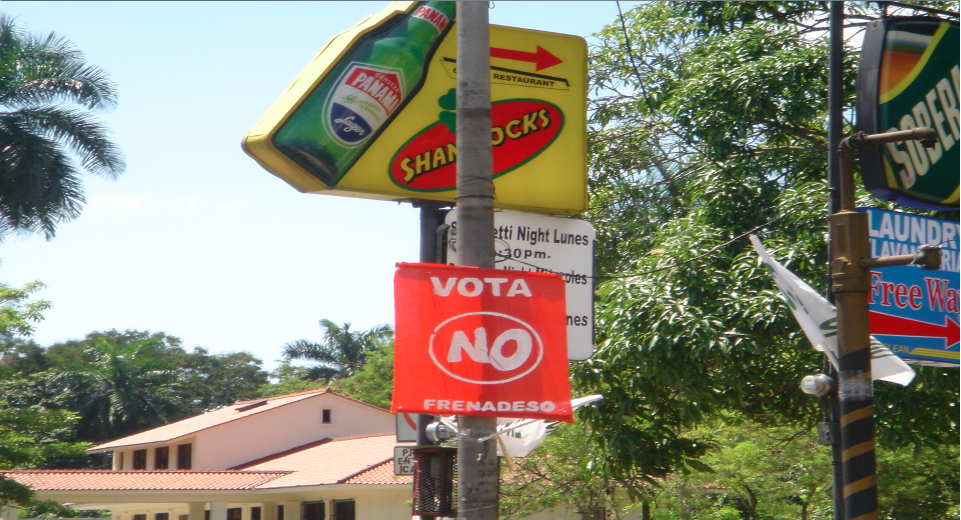Supporters of the proposal to build a third set of locks in the Panama Canal have hurried to explain that the Panama Canal Authority (ACP) has since the hand-over of the Canal managed its operations efficiently, transparently and professionally. But is that true, and is it a guarantee for the future?
ENRON ACCOUNTING
Critics and observers are increasingly alarmed by rogue consultants and questionable outfits being hired by the ACP to work on the project. For example, the first year of the Canal being owned and run by Panama, the accountancy was done by none other than the firm of Arthur Andersen. Yes, the one of Enron fame, and hardly an example of "professional, efficient and transparent." Andersen, if our dear readers recall, was prosecuted for shredding documents related to its audit of Enron. The firm collapsed, and consists today of one office with 200 people who do little but attend to the flurry of lawsuits.
SOUTH KOREAN CORRUPTION CONSULTANT
The ACP made headlines again when Tongsun Park was arrested in Mexico during a stop-over on his way to Panama in January of this year. Tongsun Park, a South Korean lobbyist who was wanted for his role in the United Nations Oil-for-Food scandal, was on his way to Panama for consultations about the expansion project.
Initially, the ACP and the government denied even knowing who Tongsun Park was, but later admitted that ACP chief Alberto Aleman Zubieta and Vice President Samuel Lewis Navarro had met with him in Seoul to talk about the Canal project.
Apparently, the ACP and government had reasons to hide their involvement with the fugitive, and the affair further shows that the ACP and the government in reality operate as one identity and that the separation between the two, often emphasized by supporters of the Canal expansion as if the ACP were an island of transparency amidst seas of corruption, is in fact artificial.
Furthermore, Tongsun Park is not just another lobbyist. He was a key figure in the 1970's Koreagate bribery scandal that netted a member of congress a prison sentence. Park, nicknamed "The Asian Great Gatsby," further counted such figures as Saddam Hussein, Reverend Sun Myung Moon and - back to Panama - Manuel Antonio Noriega among his clientele.
Park was convicted in July for his role in the UN oil-for-food scandal in US court. One detail about that scandal is worth mentioning here: The company used as a conduit for Iraqi oil illegally taken from the exchange program was incorporated in Panama by law firm Arias Fabrega & Fabrega, which also served as its resident agent. Some partners of that firm are related to members of the government.
BIG DIG BUNGLERS BUDGET BIG CANAL
The engineering and financial studies for the proposed Canal expansion have been questioned by numerous independent experts and engineers, most of whom agree that the cost of the project will be substantially higher than the ACP projects.
One reason for scepticism might be that the consultancy and engineering firm that did the number crunching on the budget for the Canal proposal is none other than Parsons Brinckerhoff.
Their recent claim to fame is a mega-project in Boston that turned into a financial, legal, political and engineering disaster that has already taken one life. Nicknamed "The Big Dig," the most expensive highway project in U.S. history consisted of a series of tunnels, ramps and bridges in and around Boston. The project had an initial price tag of $2.6 billion, but ended up costing almost 6 times that amount, courtesy of Parsons Brinckerhoff. Despite massive cost overruns, construction of the project leaves much to be desired. First it turned out that the tunnels were leaking. Then, all tunnels were closed after a concrete slab came down from the ceiling, landed on a car and killed a Costa Rican woman.
Will we have collapsing locks, levees and massive cost overruns with the Panama Canal project as well? The ACP says that the bidding process on the actual construction work has not started yet. But Parsons Brinckerhoff already did the budget for the ACP, and there is little to indicate that these numbers are in fact an accurate representation of what a third set of locks will eventually cost.
The "professional and transparent" history of the ACP: An accounting firm that collapsed because of fraud and corruption, an attempt to hide shadowy dealings with a rogue Korean bribery consultant and a budget made by a bungling engineering firm. It can not surprise anyone that this poor choice of friends is not generating a lot of confidence among Panamanians.
